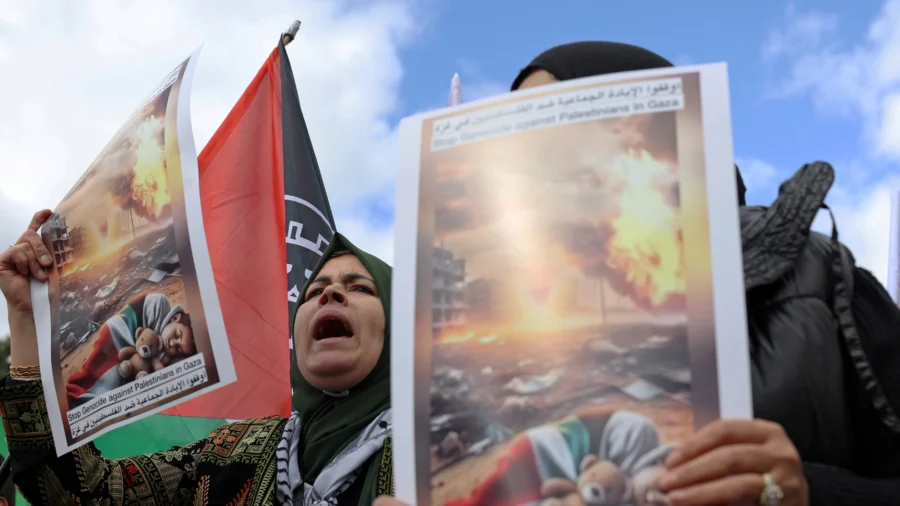The Oct. 7 Hamas terror attacks on Israel were likely carried out with the intent to provoke a forceful military response that would upset other nations in the region and put Israel at odds with its neighbors, according to terrorism researcher and foreign policy analyst Walid Phares.
In the days after Hamas gunmen breached the Israel–Gaza barrier and killed more than 1,400 Israelis, most of them civilians, Israel Defense Forces (IDF) have responded with a campaign of airstrikes and some limited ground missions into the Gaza Strip, targeting Hamas. Israel has also restricted the flow of food, water, electricity and fuel into the Gaza Strip. In turn, members of the international community have increasingly warned of civilians being killed or displaced by the Israeli airstrikes and of Gazans being deprived of living necessities.
“Once Hamas, you know, fight with that barbarity, Israel cannot but counter-strike,” Mr. Phares told NTD’s “America’s Hope” program on Tuesday. “And when Israel counter-strikes, that’s what they wanted. So they provoked it, to be hit by the Israelis, and then run around with their troops around the world … and say, ‘Oh, they’re killing our civilians.”
It is difficult to immediately verify the total number of casualties from the Gaza Strip or attribute responsibility for their deaths, but are believed to be in the thousands. The United Nations International Children’s Emergency Fund reported last week that some 2,360 children have been killed and 5,364 children have been injured in the Gaza Strip in the first 18 days of the fighting alone.
Mr. Phares—who serves as co-secretary general of the Transatlantic Legislative Group, a think-tank focused on security policy for the United States and European Union—said Iran specifically wanted to use this Hamas attack to provoke the Israel response and the ensuing public relations challenges it has faced in the war.
While U.S. and Israeli government officials have yet to identify a specific Iranian link to the Oct. 7 Hamas attack, the U.S. State Department has previously assessed that Iran does fund terror groups like Hamas to destabilize the Middle East.
Mr. Phares said the current Iranian regime wanted the Oct. 7 attacks as a way to specifically stifle a burgeoning rapprochement between Israel and the Islamic kingdom of Saudi Arabia. He said such a normalization in Israeli–Saudi relations would have isolated Iran in the Middle East.
“So [Iran] prepared Hamas, they prepared [the Hezbollah terrorist group] in the north of Israel for an operation that would at least delay, paralyze, or break down the Israeli–Saudi rapprochement that by itself already would be a catastrophe if it happens,” Mr. Phares said.
Israeli Prime Minister Benjamin Netanyahu had expressed optimism for a breakthrough with Saudi Arabia prior to the Oct. 7 attacks. In a Sept. 20 meeting with President Joe Biden, Mr. Netanyahu said such an Israeli–Saudi rapprochement “is something within our reach.” In an interview with Fox News that same week, Saudi Arabian ruler and Crown Prince Mohammad Bin Salman said “Every day we get closer” to such a deal with Israel but said his side was still seeking terms that would “ease the life of Palestinians.”
Following the Oct. 7 attacks, reports emerged that the Saudi side had paused talks toward normalizing ties with Israel.
Israel has already normalized ties with other Arab nations through the Abraham Accords, including Bahrain, Morocco, Sudan, and the United Arab Emirates.
Netanyahu Rejects Ceasefire Calls
If Mr. Phares’s assessment is accurate, the more Israel tries to defang or even eradicate Hamas, the more it risks jeopardizing their relations with Saudi Arabia and other regional partners.
Bahrain, Morocco, Sudan, and the United Arab Emirates were among the 120 countries that voted in favor of a non-binding United Nations resolution calling for “an immediate and sustained humanitarian truce leading to a cessation of hostilities” in the Gaza Strip. The foreign ministry of the United Arab Emirates has expressed concerns about “the Israeli military escalation” in Gaza and condemned any Israeli ground operations in the Gaza Strip, while the foreign ministry of Bahrain has condemned “the Israeli war on the Gaza Strip.”
Mr. Netanyahu rejected calls for a ceasefire on Monday, likening such talk to a demand for the Israeli side to surrender.
“Israel will not agree to a cessation of hostilities with Hamas after the horrific attacks of October 7,” the Israeli prime minister said in English remarks during a Monday press conference. “Calls for a ceasefire are a call for Israel to surrender to Hamas, to surrender to terrorism, to surrender to barbarism. That will not happen. Ladies and gentlemen, the Bible says that there is a time for peace and a time for war. This is a time for war.”
Mr. Phares said after Israel is done “dismantling” Hamas, it should come to Israel’s Arab partners in the Abraham Accords to intervene in Gaza.
“Israel has partners, we have partners—they need to come in, they need to change the educational system inside Gaza. It should be Arabs who will actually de-radicalize, or at least end the era of, the jihadists in Gaza,” he said.


